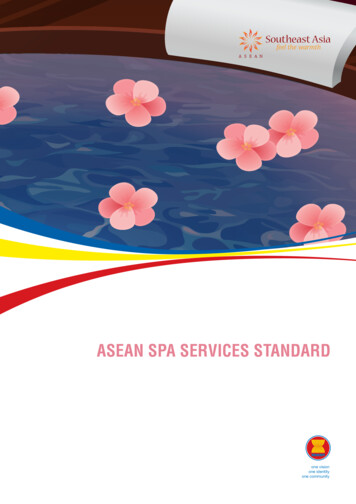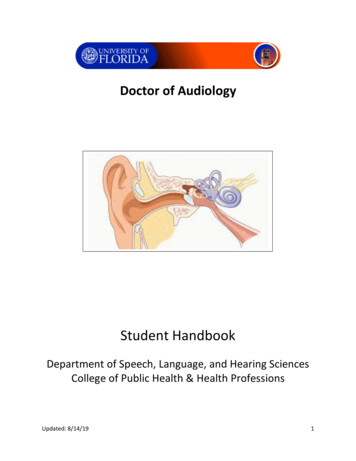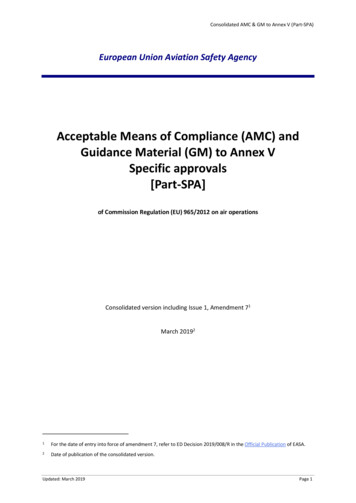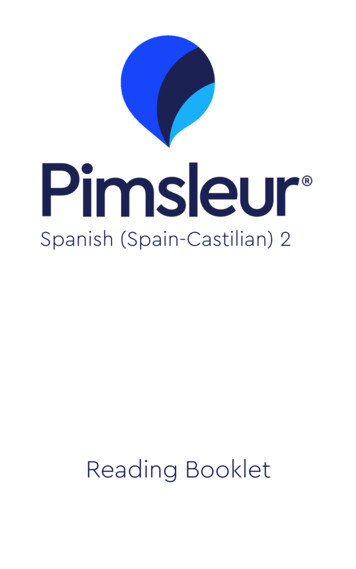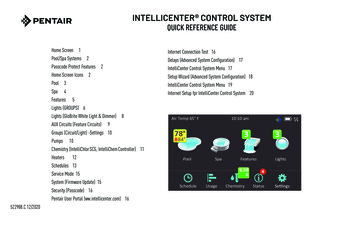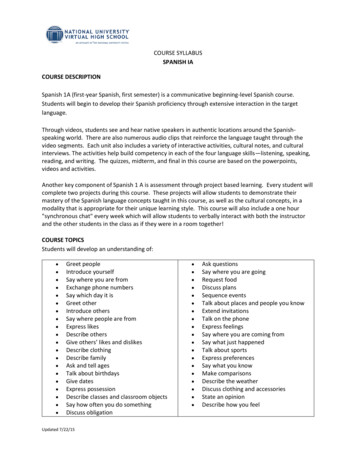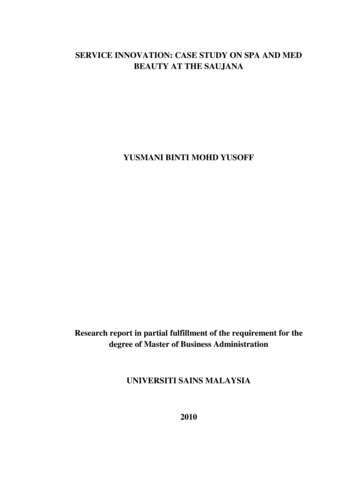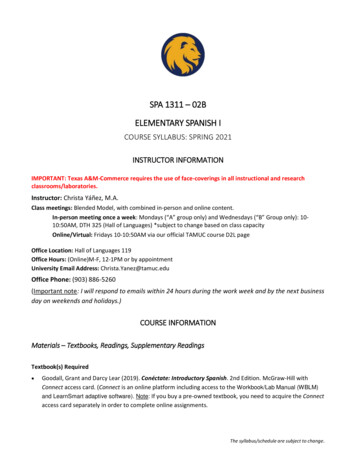
Transcription
SPA 1311 – 02BELEMENTARY SPANISH ICOURSE SYLLABUS: SPRING 2021INSTRUCTOR INFORMATIONIMPORTANT: Texas A&M-Commerce requires the use of face-coverings in all instructional and researchclassrooms/laboratories.Instructor: Christa Yáñez, M.A.Class meetings: Blended Model, with combined in-person and online content.In-person meeting once a week: Mondays (“A” group only) and Wednesdays (“B” Group only): 1010:50AM, DTH 325 (Hall of Languages) *subject to change based on class capacityOnline/Virtual: Fridays 10-10:50AM via our official TAMUC course D2L pageOffice Location: Hall of Languages 119Office Hours: (Online)M-F, 12-1PM or by appointmentUniversity Email Address: Christa.Yanez@tamuc.eduOffice Phone: (903) 886-5260(Important note: I will respond to emails within 24 hours during the work week and by the next businessday on weekends and holidays.)COURSE INFORMATIONMaterials – Textbooks, Readings, Supplementary ReadingsTextbook(s) Required Goodall, Grant and Darcy Lear (2019). Conéctate: Introductory Spanish. 2nd Edition. McGraw-Hill withConnect access card. (Connect is an online platform including access to the Workbook/Lab Manual (WBLM)and LearnSmart adaptive software). Note: If you buy a pre-owned textbook, you need to acquire the Connectaccess card separately in order to complete online assignments.The syllabus/schedule are subject to change.
A good Spanish-English bilingual dictionary (for instance: Harper Collins’ Spanish Concise Dictionary. NewYork: Harper Collins; Diccionario Español-Inglés Cumbre. Madrid: Everest). Other required materials: Access to a computer with good video interface; also recommended a goodheadset to complete speaking and listening activities.Course DescriptionElementary Spanish I is the initial course in the four-course sequence of the Spanish Language Program atTAMUC. The course has been designed for second-language learners (this is, students whose first language isnot Spanish). The Spanish Program has adapted the ‘CAN-DO’ performance standards based on the MCER andACTFL frameworks; considering these standards, students will start developing competence in the fourcommunication skills, and they are expected to reach the Novice-Mid level by the end of the course (ACTFL2012). They will also gain knowledge of various cultural aspects of the Spanish-speaking world by exploringcultural products and practices from Hispanic communities in the US and abroad.Student Learning OutcomesStudents who successfully complete the course will:1. Demonstrate basic Spanish production skills (speaking and writing) by discussing information aboutthemselves, their families / friends, their preferences, and topics related to the immediate environment(classes, weather, seasons, daily routines /activities, etc.).2. Demonstrate initial listening and reading skills by analyzing and understanding Spanish simple texts(news, brochures, short descriptions, etc.) related to daily life routines/activities.3. Demonstrate management of initial communicative strategies to support oral interactions andreading/listening comprehension.4. Investigate, describe, and reflect on cultural products and practices of the Spanish-speakingcommunities, in the US and abroad.Collection of Data for Measuring Institutional EffectivenessIn order to measure the level of compliance with the university’s Institutional Effectiveness guidelines, I will collectsome of the ungraded materials you will produce for the class. These materials will be part of a portfolio created onyour behalf and will be measured to ensure that our program “promotes practices that result in higher studentacademic achievement; an enhanced student experience; aligned and transparent decisions; and readily availableinformation for improvement, accountability, and accreditation” (Institutional tionalEffectiveness/default.aspx). This is solely an assessment of programeffectiveness and in no way affects students’ course grades or GPAs.Minimal Technical SkillsStudents in this course are expected to be able to: a) manage TAMUC Library resources for advance academicresearch; b) competently use MSFT Office tools (Word, Excel, PPoint); c) access, navigate and use the diversetools included in the course MyLeoOnline (D2L).Student ResponsibilitiesStudents’ participation is essential and required to succeed in this course. Students are expected to: 1) activelyengage in all classroom activities, including the weekly virtual meetings, 2) read and prepare assigned materialsby the due dates, 3) complete and submit assignments by the due date, and 4) interact with each other and theinstructor on a regular basis.Interaction with Instructor StatementThe syllabus/schedule are subject to change.
a. Course communication. Good communication in an online setting is a fundamental component of success.Please consider the different types of media available for communication with your instructor and classmates, inindividual and group formats. Please follow Netiquette rules to keep our conversation professional, engagingand polite.During the semester, we will use three main means of communication: Announcements: General tool for course communication; I will post short messages or reminders relatedto due dates or changes in the assignments. Email: Please only use the official TAMUC Leo Email to communicate with me and your classmates. I willsend general emails with information related to the course, date changes, assignments modifications, etc.or with information that relate to our content. I will send individual emails as needed. I will respond toemails in 24 hs. during the work week and by the next business day on weekends and holidays.To setup the TAMUC email contact HelpDesk helpdesk@tamuc.edu or call 903-468-6000; you may alsoaccess information at https://leo.tamuc.edu. General Discussion Board: Located in the “General Resources” folder, this board is open to all participants;anyone can post a comment, question or suggestion related or unrelated to the course. All students areencouraged to participate and post responses; I will visit this board regularly.GRADINGActivities & assessments1. Quizzes: There will be four short quizzes based on each unit content, focusing on vocabulary, languagestructures, and language strategies. Each test represents 10% of the final grade. For relevant dates please see“Tentative Course Schedule”.2. Mid-semester interview: An individual oral interview will be conducted at mid-semester to measure students’oral skills development. Depending on students’ individual situation, the interview will be conducted face-toface or in a virtual format. The interview will consist of a number of questions related to the topics discussed inclass. See the “Interview Rubric” for details. This activity represents 10% of the final grade.3. Online activities: Students will complete diverse online exercises every week in the Connect online workbook,including listening, reading and writing activities. Completion of the online HW is required to fully participate inthe face-to-face sessions, and to succeed in the IPA evaluation. The activities are expected to be completed bythe due date indicated in the “Tentative Course Schedule”, and they will be evaluated by level of completion andaccuracy.In addition, you will participate in MyLeoOnline discussion boards, completing creative activities to practicewriting and oral skills. Online activities represent 30% of the final grade.4. Integrated Performance Assessment (IPA).The Spanish Language Program has incorporated the Integrated Performance Assessment (IPA) framework as primarymodel for assessing students’ progress. Following CARLA (2019) description, IPA is a set of interrelated linguistic taskswhich allows students to demonstrate their Spanish competence on the three modes of communication: Interpretive(reading/listening and completing a comprehension activity); Interpersonal (interacting with another student or theinstructor); and Presentational (writing or orally presenting information to an audience). The three tasks are alignedwithin a single theme, reflecting the manner in which learners will naturally use the language in the real world beyondthe classroom. Students in SPA 1311 will complete a final IPA cycle at the end of the semester (please see the“Tentative Schedule” for relevant dates). Students are required to complete the full IPA cycle in order to be assessed;an incomplete cycle cannot be evaluated, therefore if the student misses any of the three tasks, the resulting gradewill be 0 (zero). The IPA cycle will be evaluated with scoring rubrics that rate performance in terms of whether thetask meets expectations, exceeds expectations, or does not meet expectations.The syllabus/schedule are subject to change.
The Interpersonal and Presentational tasks will require that you connect with your instructor and classmates throughthe online communication tool in MyLeoOnline; please plan ahead so you have the date and hour reserved tocomplete these tasks at the end of the semester. See the Tentative Course Scheduler for more information.GRADINGQuizzes:Online activities:Oral interview:IPA I:Total:40% (4 x 10%)30%10%20%100%Final grades in this course will be based on the following scale:A 100%-90%B 89%-80%C 79%-70% D 69%-60% F 59% or Below6. Extra-creditThe Spanish Program at TAMUC presents a variety of events each Spring and invites you to actively participate. 3extra-points will be granted after attending the event/s and completing the assigned activities.Final grades in this course will be based on the following scale:A 90%-100%; B 80%-89%; C 70%-79%; D 60%-69%; F 59% or Below.COURSE AND UNIVERSITY PROCEDURES/POLICIESCourse Specific Procedures1. Participation: Attendance and participation in the face-to-face / virtual sessions are fundamental to succeedin this course. You are expected to attend all class meetings either in person, following TAMUC Covid-19pandemic guidelines, or virtually through videoconferencing. For more information, please see “UniversityProcedures Policies” in the next section of the syllabus.Student athletes, band members and members of other university sanctions should bring a letter from theirsupervisor or specific department during the first week of class indicating the dates they will miss class.Students who require special accommodations for religious holidays should make arrangements with theirinstructor during the first week of class.2. Syllabus Change PolicyThe syllabus is a guide. Circumstances and events, such as student progress, may make it necessary for theinstructor to modify the syllabus during the semester. Any changes made to the syllabus will be announced inadvance.3. Withdraws & Incomplete grade.A student may drop a course by logging into his/her myLeo account and clicking on the hyperlink labeled “Dropa class” from among the choices found under the myLeo section of the web page.I reserve the right to drop a student from the course administratively for excessive absences or violations of theCode of Student Conduct. Incomplete grades (grade of “X”) are granted only under rare and extraordinarycircumstances which are fully documented; students requesting an incomplete grade should contact theinstructor as soon as possible, provide all pertinent documentation, and sign the ‘X’ grade contract which detailsthe coursework they need to complete to pass the class.The syllabus/schedule are subject to change.
4. Grievance procedures.Students who have concerns regarding their courses should first address those concerns with the assignedinstructor in order to reach a resolution. Students who are unsatisfied with the outcome of that conversation orhave not been able to meet individually with their instructor, whether in-person, by email, by telephone, or byanother communication medium, should then schedule an appointment with the Director of the SpanishProgram, Dr. Flavia Belpoliti (flavia.belpoliti@tamuc.edu). If there are still unresolved issues, students need toschedule an appointment with the Department Head, Dr. Hunter Hayes, by completing a Student GrievanceForm (available in the Department Main Office, HL 141). In the event that the instructor is the DepartmentHead, the student should schedule a meeting with the Dean of the College of Arts, Sciences, and Humanitiesafter following the steps outlined above; if the instructor is the Assistant Department Head, students shouldschedule a meeting with the Department Head. Where applicable, students should also consult UniversityProcedure 13.99.99.R0.05 (“Student Appeal of Instructor Evaluation”).5. Extra-creditDuring the semester you will invited to participate in different activities and short projects (online filmscreening; virtual lectures, etc.). Up-to 3 extra-points will be granted after attending the event/s and completingthe assigned activities.University Specific ProceduresStudent ConductAll students enrolled at the University shall follow the tenets of common decency and acceptable behaviorconducive to a positive learning environment, in the classroom and in online environments, as described in theCode of Student Conduct. For more information, please see Student Guidebook.In addition, students should also consult the Rules of Netiquette for more information regarding how to interactwith peers, instructors and/or administrators in an online forum: https://www.britannica.com/topic/netiquetteTAMUC AttendanceFor more information about the attendance policy please visit the Attendance webpage and ic/13.99.99.R0.01.pdfAcademic IntegrityPlagiarism is borrowing the work of others and not giving credit where credit is due. It is unethical and reflectsvery poorly on a person’s character. Copying someone else's work or asking a friend or tutor to write your workconstitutes a violation of the TAMUC Academic Honesty Policy. Likewise, the use of electronic media to translateyour work to Spanish is also unacceptable. Instructors in the Department of Literature and Languages do nottolerate plagiarism and other forms of academic dishonesty. Instructors uphold and support the highestacademic standards, and students are expected to do likewise.Penalties for students guilty of academic dishonesty include disciplinary probation, suspension, and expulsion.Students at Texas A&M University-Commerce are expected to maintain high standards of integrity and honestyin all of their scholastic work. For more details and the definition of academic dishonesty see the followingprocedures:Graduate Student Academic Dishonesty 13.99.99.R0.10The syllabus/schedule are subject to change.
Students with Disabilities - ADA StatementThe Americans with Disabilities Act (ADA) is a federal anti-discrimination statute that providescomprehensive civil rights protection for persons with disabilities. Among other things, this legislationrequires that all students with disabilities be guaranteed a learning environment that provides forreasonable accommodation of their disabilities. If you have a disability requiring an accommodation,please contact:Office of Student Disability Resources and ServicesTexas A&M University-CommerceGee Library- Room 162Phone (903) 886-5150 or (903) 886-5835Fax (903) 468-8148Email: studentdisabilityservices@tamuc.eduWebsite: Office of Student Disability Resources and ServicesNondiscrimination NoticeTexas A&M University-Commerce will comply in the classroom, and in online courses, with all federal and statelaws prohibiting discrimination and related retaliation on the basis of race, color, religion, sex, national origin,disability, age, genetic information or veteran status. Further, an environment free from discrimination on thebasis of sexual orientation, gender identity, or gender expression will be maintained.Campus Concealed Carry StatementTexas Senate Bill - 11 (Government Code 411.2031, et al.) authorizes the carrying of a concealed handgun inTexas A&M University-Commerce buildings only by persons who have been issued and are in possession of aTexas License to Carry a Handgun. Qualified law enforcement officers or those who are otherwise authorized tocarry a concealed handgun in the State of Texas are also permitted to do so. Pursuant to Penal Code (PC) 46.035and A&M-Commerce Rule 34.06.02.R1, license holders may not carry a concealed handgun in restrictedlocations.For a list of locations, please refer to the Carrying Concealed Handguns On Campusdocument and/or consult your event organizer.Pursuant to PC 46.035, the open carrying of handguns is prohibited on all A&M-Commerce campuses. Reportviolations to the University Police Department at 903-886-5868 or 9-1-1.Pandemic COVID-19 Response StatementsA&M-Commerce requires the use of face-coverings in all instructional and research classrooms/laboratories.Exceptions may be made by faculty where warranted. Faculty have management over their classrooms. Studentsnot using face-coverings can be required to leave class. Repetitive refusal to comply can be reported to theOffice of Students’ Rights and Responsibilities as a violation of the student Code of Conduct.Students should not attend class when ill or after exposure to anyone with a communicable illness.Communicate such instances directly with your instructor. Faculty will work to support the student gettingaccess to missed content or completing missed assignments.The syllabus/schedule are subject to change.
Tentative Course ScheduleImportant notes:This course schedule is subject to revisions and changes as the instructor deems necessary. Any changes to thecourse schedule will be announced in class and on the course website in advance.Tests, assignments, and other projects have specific due dates. However, as the COVID-19 pandemic continuesto affect our daily lives, situations may arise where a task cannot be completed by the deadline. In this case,please contact me to reschedule the assignment.WeekWeek I1/11-1/16Topics & ActivitiesCourse presentationLanguage learning strategies1/18AssignmentsComplete ‘Honesty Agreement’ in D2LMyLeoOnline.Register in McGraw Hill-Connect.Discussion boardMartin Luther King, Jr. HolidayWeek 21/18-1/23Cap. 1: En la claseWeek 31/25-1/30Cap. 1: En la clase. Escuchemos y hablemosMcGraw Hill- Connect HWDiscussion boardMcGraw Hill- Connect HWWeek 42/1-2/6Quiz 1Cap. 2: Mis amigos y yo.McGraw Hill- Connect HWDiscussion boardWeek 52/8-2/13Cap. 2: Mis amigos y yo.McGraw Hill- Connect HWWeek 62/15-2/20Cap. 2: Mis amigos y yo. Escuchemos y hablemos.Week 72/22-2/27Quiz 2Cap 3. ¿Qué haces?Cap 3: ¿Qué haces?Week 93/8-3/13Cap 3: ¿Qué haces?McGraw Hill- Connect HWDiscussion boardMcGraw Hill- Connect HWOral interviewsMcGraw Hill- Connect HWOral interviewsMcGraw Hill- Connect HWWeek 103/15-3/20Cap 3: ¿Qué haces? Escuchemos y hablemos.McGraw Hill- Connect HWWeek 113/22-3/27Quiz 3.Cap. 4: ¡Qué bonita familia!Cap. 4: ¡Qué bonita familia!McGraw Hill- Connect HWDiscussion boardMcGraw Hill- Connect HWCap. 4: ¡Qué bonita familia!McGraw Hill- Connect HWDiscussion boardWeek 144/12-4/17Cap. 4: ¡Qué bonita familia! Escuchemos yhablemos.McGraw Hill- Connect HWDiscussion boardWeek 154/12-4/17Quiz 4.IPA preparationFinal IPAWeek 83/1-3/5Week 123/29-4/3Week 134/5-4/10Week 16The syllabus/schedule are subject to change.
4/19-4/23TECHNOLOGY REQUIREMENTSLMSAll course sections offered by Texas A&M University-Commerce have a corresponding course shell in the myLeoOnline Learning Management System (LMS). Below are technical requirementsLMS rticle/Brightspace-Platform-RequirementsLMS Browser rightspace/requirements/all/browser support.htmYouSeeU Virtual Classroom ESS AND NAVIGATIONYou will need your campus-wide ID (CWID) and password to log into the course. If you do not know your CWIDor have forgotten your password, contact the Center for IT Excellence (CITE) at 903.468.6000 orhelpdesk@tamuc.edu.Note: Personal computer and internet connection problems do not excuse the requirement to complete allcourse work in a timely and satisfactory manner. Each student needs to have a backup method to deal withthese inevitable problems. These methods might include the availability of a backup PC at home or work, thetemporary use of a computer at a friend's home, the local library, office service companies, Starbucks, a TAMUCcampus open computer lab, etc.COMMUNICATION AND SUPPORTIf you have any questions or are having difficulties with the course material, please contact your Instructor.Technical SupportIf you are having technical difficulty with any part of Brightspace, please contact Brightspace Technical Supportat 1-877-325-7778. Other support options can be found ontactsupportThe syllabus/schedule are subject to change.
Online/Virtual: Fridays 10-10:50AM via our official TAMUC course D2L page Office Location: Hall of Languages 119 Office Hours: (Online)M-F, 12-1PM or by appointment University Email Address: Christa.Yanez@tamuc.edu Office Phone: (903) 886-5260 (Important note: I will respond to emails within 24 hours during the work week and by the next business
